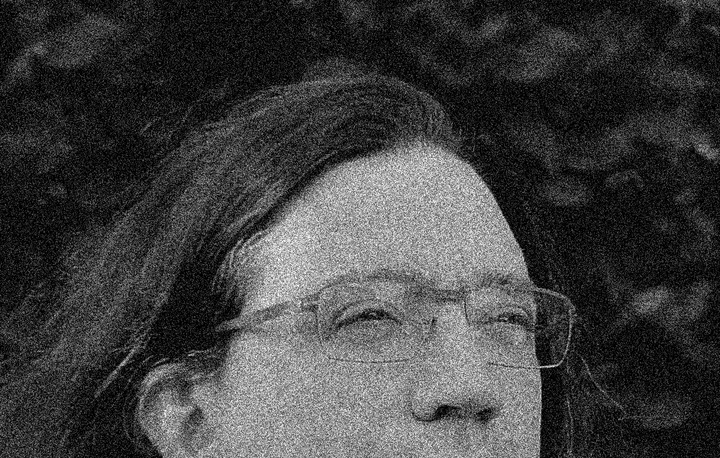What Does America Believe?
Purposeless excitement effused in belief-reality.

On May 10, 2019, Damage Magazine held a launch event in New York City. Amber A’Lee Frost and Bob Hullot-Kentor were invited to speak on the topic “What Does America Believe?” Bob Hullot-Kentor was unable to attend due to illness, and Damage editor Benjamin Fong gave a talk in his place. The talks were followed by a discussion moderated by Jeremy Cohan. What follows is an edited transcript of Benjamin Fong’s talk.
In the field where I did my graduate work (religious studies), there are many people who have made a career of pointing out that “belief,” being a specifically Protestant concept, is a bad lens through which to understand other “religions,” and in fact is a way of reducing the complexity of other religions to something akin to Protestantism. Belief, in other words, is a bad concept through which to understand the world. This isn’t wrong, of course, but it’s turned into a form of academic non-thinking, like calling Marx “Eurocentric.” And like any belief that is mobilized with an aggressive obviousness, it blinds its adherents to a certain possibility: in this case, that belief, in its very narrowness and narcissism, might actually convey something true about us: that we are a land of believers. Sometimes degraded concepts make sense of a degraded reality.
But is this self-criticism on the mark? Are Americans uniquely invested in the category of belief, in the idea that our beliefs matter, that we can mark ourselves by our beliefs? Is there a reason for this belief in belief? Another way of posing these questions would be to ask, are Americans uniquely ideological? And if so, why?
As an American, I have to believe that Americans are indeed particularly belief-prone, because when you’re stuck inside, it’s comforting to know that there’s an outside. I have to believe that non-Americans are nimbly abutting objective reality because if they’re not—if they’re like me, with the theme songs of sitcoms from the nineties going through their heads at all times—then the twelve-year timeframe within which the recent IPCC climate change report says we must decarbonize our economy really is much too long.
But if Americans are uniquely belief-stricken, why is this so? In what follows, I will offer two explanations that point in two different directions.
Freedom from belief
First, there’s the fact that an animating ideal and impulse of the American nation, as opposed to European nations, is not freedom from belief but rather the freedom to believe. Once a year for the past couple years I’ve taught Spinoza’s Theological-Political Treatise, and my students are constantly amazed at how a text that seems so modern in its discussion of critical reading, civil rights, democracy, and so forth, can also be so backward. For instance, in its wholesale endorsement of the sovereign as the highest and only religious authority. “What about separation of church and state?” they always say.
What they often miss is that Spinoza, in wanting to remove belief from the hands of the ecclesiastical authorities, to remove religion from the sphere of civil society, was in effect trying to get rid of belief and religion altogether. God, nature—it’s all the same to him once you remove belief from the predatory influence of civil society. The idea that freedom involves the curtailment of power in civil society, so central to Spinoza, is frankly counterintuitive for Americans.
I think if Bob Hullot-Kentor were here, he would want us to wonder about what this ingrained freedom to believe in America means for today’s socialist project, which also threatens power in civil society. Are we going to assert our freedom to believe—to believe in the transhistorical power of white supremacy and patriarchy, in gender fluidity and woke taboos—or are we going to work with this freedom to believe, to see the freedom to believe as part of our organizing terrain, and thus to quickly get less squeamish about courting evangelicals and people for whom “lib-tard” is a regular part of their vocabulary? Let’s take “religion” to stand in for anything the Left finds culturally offensive: are we going to make peace with the god-fearing, or not?
Immersion in belief-reality
The second explanation of America’s uniquely ideological status, one that gets us squarely within Damage Magazine’s hermeneutic frame, has to do with an originally American institution, what Max Horkheimer and Theodor Adorno call the culture industry. Loosely defined, the culture industry refers to the forms of media (film, television, radio) invented and propagated in the first part of the twentieth century. Many commentators on the work of the Frankfurt School believe that their views of the culture industry are dated, trapped in the Fordist-Keynesian era of mass production and consumption, but we at Damage have a difficult time understanding this line of thought. That we watch Emma Stone instead of Greta Garbo, that our kids know the new Disney characters instead of the old ones, that we’re all constantly looking at screens instead of reserving a few hours after work for them—none of this adds up to a qualitative break. No doubt the invention of the internet and the forms of social media that go along with it demand an updating of the culture industry thesis, but it’s hard to see how they don’t reinforce the ability of mass media institutions to categorize and cater to commodity consumers. This is the definition of the culture industry.
The Frankfurt School believed that the birth of the culture industry actually changed the nature of subjectivity in any society it took hold over, and they made sense of this sea change in psychoanalytic terms. Whereas pre-culture industry subjects adapted themselves, always uncomfortably, to the demands of existing society by repressing and sublimating their desirous impulses, driving them underground only to have them reappear in unexpected ways, subjects in the era of the culture industry are somehow not burdened by the same conflicts. Instead they prattle on about the latest television shows, about sports, about cool concerts they went to, about newspaper articles they read a fifth of, and they seem vaguely content in doing so. They might still complain here and there about work, about feeling stressed, but they wouldn’t dare take up much conversational time with such irritations.
On the surface, it might appear that the culture industry has done its job, that it has provided the circus to complement ever-diminishing bread, but this is not the whole story. The culture industry does indeed relieve repression by immersing us in various fantasy worlds, everything from Harry Potter to the New York Times, but it does so not by actually alleviating our discontent but by severing us from it. Rather than being repressed, the unconscious becomes split off from the psyche, seen not as awkwardly imposing itself from the inside but rather as objectively persecutory from the outside.
Though they didn’t always put it in this way, I think what the Frankfurt School was trying to say was that the culture industry turns neurotic subjects into properly psychotic ones. Rather than drives and emotions pressing forth from the inside, drives and emotions are cut off from oneself and participate in the construction of a claustrophobic and paranoid reality surrounding us, so that emotional life and reality become so fused as to become indistinguishable.
This basic idea makes sense of many facets of my own experience: that people are so bright-eyed and nice, without any reason, with this wonderful hair that has been meticulously coiffed for my pleasure, and yet capable at the same of machinic severity if their reality is threatened in any way; that purposeless excitement, in the forms of exclamation points and conversational effusiveness, is becoming the norm; that there is a real intolerance of debate as something substantive that is neither about simply sharing ideas nor about “destroying” the opinions of others.
I think the way to translate this all into the terms of tonight’s topic would be to say that Americans are by and large no longer believers in addition to being other things, but are now immersed in a kind of belief-reality, to which one’s psychic apparatus must be finely attuned at all times if one is to be “aware” and get ahead in the world.
Fellow Damage editor Taylor Hines describes this in a recent Damage piece, borrowing from David Riesman’s The Lonely Crowd. Hines writes that “the metaphor Riesman employs for the new character type described by the Frankfurt School is the psychological “radar,” which must constantly detect and process the symbolic actions of others. Success requires the ability to continually monitor subtle and ever-changing social signals to better adapt to the demands of a social world dictated by the needs of concentrated capital. Increased bureaucratization is coupled with the need to “get and hold” one’s place in a corporate structure. ‘What can be internalized, then, is not a code of behavior [this is what I’m taking to be belief in the classical sense] but the elaborate equipment needed to attend to [cultural] messages and occasionally to participate in their circulation. While guilt and shame, the primary controls of inner-directed society, never go away, a new psychological force—diffuse anxiety, comes to predominate.’”
The need for an analytic social psychology
I want to respond to a criticism of this line of thought—with which I’m sure many here are familiar—which is Vivek Chibber’s argument that we don’t really need a theory of ideology, a theory of the wrongheadedness of American thinking, or a theory of changes in character structure than undermine the sources of autonomy, because capitalist domination can be understood in much more straightforward terms: the terms of structural coercion. According to Chibber, people don’t uphold the status quo because they are duped into it or immersed in some psychotic paranoid state, but rather because accepting degrading work conditions is the only option they have available.
This is perfectly valid in one sense, and I think knowledge of the basics of political economy is obviously much more important for understanding the existing world than acquaintance with theories of ideology or with psychoanalysis. But I want to offer two responses.
First, I think C. Wright Mills is essentially right, in an article republished in Damage, that a new imperative on workers appeared in the era of monopoly capitalism, one that demanded not only that workers work but that they exude a pleasantness while doing so. I’ll quote from Mills:
[The new type of personality] cannot form her character by the promotional calculations and self-management of the classic heroes of liberalism or of the new entrepreneurs. There is only one area of her occupational life in which she is “free to act.” That is the area of her own personality. She must make of her personality an alert, obsequious instrument whereby goods are distributed. The white collar worker, like the wage worker in a modern factory, is alienated from the tools and products of her labor; indeed, she does not even mix labor with raw stuff to produce things. The white collar worker on a personality market must not only sell her time and energy; she must also “sell herself.” In the normal course of her work, she becomes self-alienated. For, in the personality market, the personality itself, along with advertising, becomes the instrument of an alien purpose. If there are not too many plant psychologists or personnel experts around, the factory worker is free to frown as he works. But not so the white collar employee. She must put her personality into it. She must smile when it is time to smile.
The first response, then, would be that structural coercion doesn’t just work on us from the outside, but also works on us from the inside, and in concert with the influence of the culture industry. A complete account of the structural coercion of capital, therefore, must take this inner dimension into account.
The second thing is that the novelty of the Frankfurt School didn’t lie in its ability to make sense of subjectification in late capitalism. For this, I think a standard Marxist theory does fine. Their novelty lay rather in their attempt to theorize not what we do at work, in our acceptance of domination at the point of production, but rather in what we do in our free time. In an age where the existing order has lost all of its legitimacy, what we do with our supposed free time—which Wolfgang Streeck helpfully summarizes as “coping, hoping, doping, and shopping”—has taken on an inordinate importance.
Certainly the “choices” we make in our free time, which repeat the identical existent back at us rather than seek experience that has some kind of autonomous, free, or simply imaginative-of-something-else element, are worrying in themselves. But the existence of this willing extension of the domination of the workday beyond the workday itself also poses a problem for the theory that people are not duped and only submit to domination out of structural coercion. Whether or not we work, here we have no choice. But choosing continued domination at the level of thought and experience in our free time, when there are plenty of options to do something else, points to something beyond coercion, something that can only be called ideological.
But what precisely is the relationship between this “self-imposed” domination in our free time and the maintenance of contemporary social relations? I will leave it to past and future Damage articles to answer this question. For the moment, I’ll simply note that politics is something in which the large majority of us engage in our “free time.”
■
Benjamin Fong teaches, writes, organizes, and lives in the great state of Arizona.



